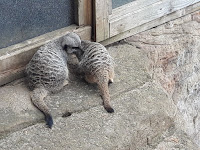My
recent holiday on the Isle of Wight turned out to be other than I was
expecting. Instead of the rather relaxed break we had intended combined with the
occasional cultural excursion, it turned out to be crammed full of history.
Our
first visit was to the Isle of Wight Zoo. Pretty innocuous, you’d think but, as
well as being privileged to see some of the wonderful animals who are cared for
by The Wildheart Trust Charity…

Little and Large
…we
were taken back to the Second World War. I learned from a friend only the day
before that the zoo is housed on the site of an old fort, remnants of which
remain. The fort played a critical role in Operation PLUTO and within it is a
small exhibition which contains one of the original pumps and some fascinating
details of the PipeLineUnderTheOcean.
 In addition to the natural history we were anticipating, we had an unexpected history lesson and another reminder of how much we owe to those who went before us. A fabulous day.
In addition to the natural history we were anticipating, we had an unexpected history lesson and another reminder of how much we owe to those who went before us. A fabulous day.
A
new day, a new outing, this time to Carisbrooke Castle and the thirteenth
century when Isabella de Fortibus reigned supreme on the Isle of Wight, ruling
it independently from the Crown.
Over the years it has been a romantic castle,
an Elizabethan artillery fortress, a king’s prison (Charles I – held for
fourteen months before his execution) and a royal summer residence. I visited
the small but fascinatingly comprehensive museum housed within the castle
walls.
 |
| Castle Bats |
 |
| Falconry Display |
 |
| Through the Centuries |
 |
| View from the Castle |
Our
final major visit was to Osborne House, described by Queen Victoria in 1845 as ‘Our
dear Osborne, which is like a little Paradise for us’. It had been a long-held
ambition of mine to see this royal residence, so renowned for being the queen’s
favourite home, and boy was it worth the wait. There is far too much history
for me to be able to share with you here so I have attached some images to give
you a taste of its splendour.
 |
| Osborne House |
 |
| Just your average ceiling |
 |
| The Billiard Room |
 |
| Fine Dining |
With
my housewifely hat on I wondered at the task of cleaning the amazing coloured
glass and ormolu chandelier depicting convolvulus, Prince Albert’s favourite
flower, and arum lilies.
I
had an amazing sense of history when I entered Queen Victoria’s bedroom. It was
in this room on 22nd January 1901 that she died, on a small couch
bed, surrounded by her children. More than a hundred years later and it felt as
though I could reach out and touch the past.
 |
| Queen Victoria's Bed |
See
you next time
Natalie








